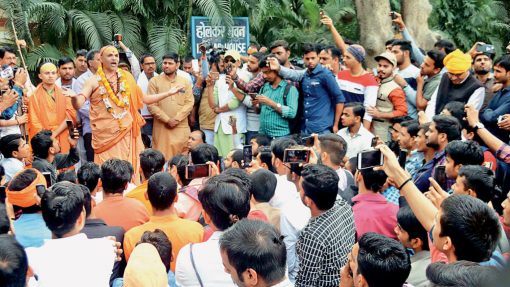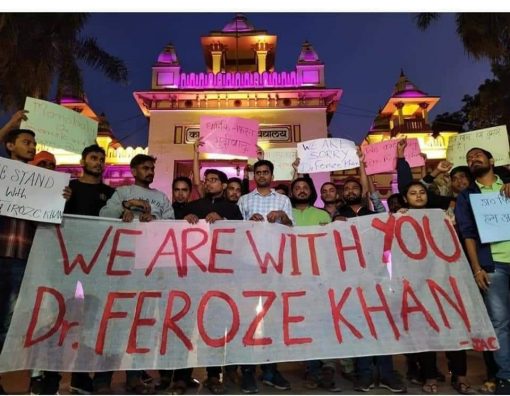
On 22nd November 2019, the students of Uttar Pradesh's famed Banaras Hindu University who had been protesting for around 2 weeks now against the appointment of a Muslim teacher Firoz Khan at the Sanskrit Department of the University, have decided to end the protest after assurance from the Vice Chancellor that “corrective” measures will be taken within 10 days.
It is not the first time we are seeing that religion and caste-based ‘protests’ by savarna Hindus holding administrations and governments ransom. Yet, a lot of aspects of this latest controversy are surprising. For example, Muslims teaching or excelling in Sanskrit is not something new in this country.
Lets look at some contemporary examples.
Ashab Ali, who retired in 2010 from the post of Head of the Department (HOD), Sanskrit at Gorakhpur's Deen Dayal Upadhyaya University, had a 33-year long career as a much loved professor despite the department being otherwise dominated by Brahmins and Thakurs. Ashab Ali had topped both his BA and MA exams in Sanskrit in 1969 and 1971. He then completed his PhD on a comparative study of Vedic and Islamic myths under the then HOD, Atul Chandra Banerjee, who also played a key role in his appointment, which led him to hold the highest position of HOD eventually.
The story of another Sanskrit scholar, 85-year old Pandit Ghulam Dastagir Birajdar, is endearing. As former General Secretary of Vishwa Sanskrit Pratishthan in Varanasi and presently the Chairman of the committee engaged in preparing Sanskrit school textbooks for schools in Maharashtra, he is a master of the language and is often asked by local Hindus to solemnise marriages, preside over pujas or perform last rites. He has also taught many Hindus how to recite and perform Hindu rituals.
Meraj Ahmed Khan, who is an Associate Professor of Sanskrit at Kashmir University says, “What we teach in universities is modern Sanskrit which has nothing to do with religion”.Adding that he was never discriminated against for being a Muslim scholar of Sanskrit, he said, “If they did, they wouldn’t award me a gold medal in MA”.
Salma Mahfooz, renowned Sanskrit scholar from the Aligarh Muslim University (AMU) of Uttar Pradesh, was the first Muslim woman in the world to be awarded a PhD in Sanskrit. She has taught Geeta, Vedas, Upanishads and guided more than 15 PhD scholars during her career. Commenting on the BHU row she quipped, “Mazhab apni jagah hai, taleem apni jagah” (Religion has its own place, and education and upbringing has its own place).

The examples are endless. The Sanskrit Department’s Chairman at Aligarh Muslim University is Mohammed Shareef, retired associate professor (Rashtriya Sanskrit Sansthan Delhi) Mohammad Haneef Khan Shastri was conferred the title of “Shastri” by former President of India Shankar Dayal Sharma; even the person at the centre of the present controversy, Firoz Khan, is not the first in his family to study Sanskrit. His grandfather Gafur Khan would sing bhajans for Hindu audiences in Rajasthan and his father Ramjan Khan studied Sanskrit would often preach on the need to look after cows in Jaipur's Bagru village.
While it remains to be seen if BHU administration upholds Firoz Khan’s appointment, on the other end of the spectrum, Ramzan Khan and Ganesh Tudu have been appointed as assistant professors of Sanskrit at the Ramakrishna Mission Vidyamandira in west Bengal. This is for the first time in Bengal when a Muslim and a Tribal teacher, both of whom are non-Hindus, will be teaching in an autonomous college.
Historically, Sanskrit was studied ardently and was part of the Mughal culture.
Audrey Truschke, in her book, Culture of Encounters: Sanskrit at the Mughal Court, says:
“Mughals sought to integrate the culture of the Sanskrit language and literature in the evolution of the Mughal state system… a worldview that envisioned the Mughal court and by extension the Mughal state as a multi-cultural and multi-lingual cosmos…”
The study of any language is a foray into its beauty and the richness of its literature. Language is not and has never been the domain of any religion. So why is it suddenly an issue now? The current political climate is enhancing a divisive movement on the basis of any differences that seem to not align with the majority- be it religion, caste, language, or even diversity in sexuality and gender identities. These create distraction tactics for the youth who face abysmal future prospects in a crumbling economy. The nation seems to be coming apart at the seams and yet the so called "nationalist" agendas are only hampering nation building. It has been said time and again that our burgeoning population can be our biggest asset to move up on the path to development. But as long as the population is divided and distracted by meaningless controversies, we conveniently play into the hands of politicians who are looking for their own short-term benefits. How is this any different from the divide and rule tactics of our colonizers?
Maybe the human touch is the only solution we have, to reach out to fellow citizens and preach a language of empathy. If we have a universal language of understanding, maybe we wouldn’t resort to the language of hate anymore.




